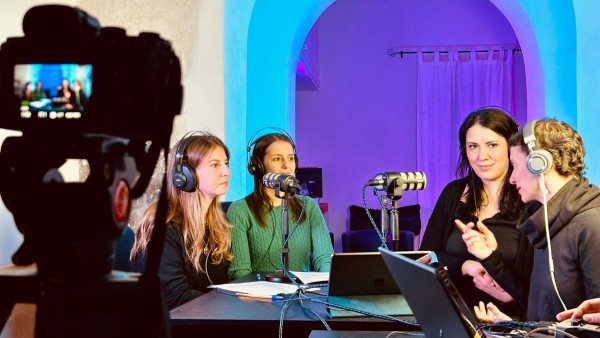IPI Director David Dadge is speaking today at an event in Oviedo, Spain, hosted by the Press Association of Asturias in recognition of World Press Freedom Day and the Association’s 100th anniversary. The group consists of 300 journalists from the region of Asturias. Mr. Dadge’s speech, entitled “Why Information wants to be Free” is reproduced below.
Ladies and Gentlemen,
I would like to thank the Asturian Press Association for kindly inviting me to speak in the lovely city of Oviedo, the capital city of the Principality of Asturias.
The subject of my speech, ladies and gentleman, is press freedom – in particular why I believe that information is crucial to our lives both as individuals as well as members of societies, and why censorship, the antithesis to that freedom, is so harmful.
And, I can think of no better day to speak about these vital issues. Today is May 3, World Press Freedom Day; the day when the global media unite to recognize and applaud the bravery and courageousness of journalists across the globe who uphold Article 19 of the Universal Declaration of Human Rights, which confers the fundamental right to “seek, receive and impart information.”
However, before doing so, I should like to say a few words about the International Press Institute–IPI. Founded in 1950 at Columbia University, IPI is a membership organization dedicated to the defense and strengthening of global press freedom. It is comprised of editors, media executives and leading journalists and we have high-profile members from organizations such as the BBC, the New York Times, the NZZ in Switzerland, Deutsche Welle and the Guardian newspaper.
The organization has one major goal: “The furtherance and safeguarding of freedom of the press, by which is meant: free access to the news, free transmission of news, free publication of newspapers, and free expression of views.” IPI meets these goals through a mixture of protests, projects and missions designed to raise the voice of IPI’s membership in the defense of the media.
Returning to my theme! In 1984 Stewart Brand was credited with first using the expression, “information wants to be free.” In using that expression Brand was arguing that information should be free in terms of being “without cost or payment”. It is a view expressed by others including Richard Stallman, an American Software Freedom Activist, who said in 1990, “I believe that all generally useful information should be free.”
More recently, the editor-in-chief of the magazine Wired, Chris Anderson, has returned to this argument in his book, Free: the Future of a Radical Price. Free is a meditation on the price for information and why it is so difficult to compete against information freely offered.
Obviously, this debate, while important, is adrift from our chief concern today, but I want to take the expression “information wants to be free” and apply another dictionary meaning to the word “free;” free as in “not confined, obstructed, or fixed.” In other words, information that is not controlled or prohibited!
It is my contention that for millions of individuals around the world this notion of “free” is little more than an aspiration: much promised, rarely delivered!
For evidence of this desire to obstruct the flow of information, you have only to look at the so-called Great Firewall of China. This firewall prevents hundreds of millions of people expressing freedom of choice on the Internet. It hinders understanding on human rights and other issues essential to Chinese society. But it is much more than a barrier, it is also a surveillance structure, run by thousands of “watchers,” punishing individuals who dare express themselves contrary to the received wisdom of the Chinese state.
Individuals such as freelance journalist Kunga Tsayang, who received five years’ imprisonment for daring to author articles about politics and Tibet; or Jin Haike or Xu Wei, who in 2001 were imprisoned for writing online articles about reform. Both of them received 10 year sentences.
In a very real way these individuals are the prisoners of censorship; they pay the price when authoritarian governments refuse to accept that information should be accessible, should be free.
Elsewhere, in Zimbabwe, the independent media has been devastated by the government of Robert Mugabe, which has consistently refused to accept that freedom of expression is to be prized rather than stifled. Starting in 2000, Robert Mugabe passed stringent laws introducing an unjust licensing system for journalists and media organizations. These laws have been so harmful that, only now, 10 years later, is the independent media beginning to emerge from this darkness.
In countries such as Cuba, and Eritrea, independent journalists were arrested en masse and now languish in jail, often in appalling conditions. Some in Eritrea are believed to have died while in prison, but the government refuses to acknowledge this fact. At present, according to the figures of the Committee to Protect Journalists, 22 and 19 journalists are believed to be held in prison in Cuba and Eritrea respectively. There are other countries, across the world: Iran, Burma, Uzbekistan, Algeria, Tunisia, Azerbaijan, the list goes on, and on. All refuse to acknowledge the right of the individual to “seek, receive and impart information.”
Earlier I mentioned that the delivery of information often comes at a cost. What is that cost? And more importantly, who pays? I believe that the price is paid by journalists, and often, it is a price paid in their blood.
According to IPI’s Death Watch figures, between 2000 and the end of 2009, 742 journalists were killed while practicing their profession. 171 were killed in Iraq, 94 in the Philippines, 58 in Columbia, 40 in Mexico, and 35 in Russia. In 2010, 22 journalists have been killed so far, with five killed in both Mexico and Honduras.
I hope you will agree that these figures represent a tragedy not only for the loved ones of the journalist, but also for the local media environment. The murder of a journalist is a cost paid again and again by other journalists; it spreads a layer of fear over the profession. There is another unspoken cost: the perpetrators of these murders often escape with impunity and are free to murder again. These elements combine to create a cycle of murder and impunity with devastating consequences for the media profession.
I want to expand on why it is so important that information is free. All of us need information to make decisions about our daily lives, we need information about electoral candidates, the performance of our local councils, our police, about corruption and a thousand other matters. Why? Because, without this information we cannot make meaningful choices and decisions about the world! It is information that informs our world, enabling all of us to participate in society.
Where information is “confined, obstructed, or fixed” we lack the understanding needed to effectively participate. In effect, we are separated from the society around us. And, let us be clear, it is the goal of authoritarian governments all over the world to create societies that, through the lack of information, are unable to make choices and express themselves. This is done in the belief that ignorance breeds acceptance.
Having examined the Why? Perhaps it is time to examine the Who? As the director of a press freedom organization, it is my belief that it is journalists who, through their work, provide essential information. Without journalists we would find the world less understandable, more confusing.
I think now, Ladies and Gentleman, it is perhaps time to come clean about something! Quite obviously, information is itself devoid of any intent. In reality it is us! We all want to be free, don’t we? We all want the opportunity to make informed choices and we all want the necessary information to make those choices.
At the beginning of the 21st Century and with the advent of new media, it is time to reject censorship and to restate the case in every society that individuals want to be free. We have to combine our voices to convince those who would like us to be silent (and therefore ignorant) that, however hard they resist, information will always escape. It is a reality that all governments should recognize and they should alter their policies accordingly.
Finally, I think it important to pay tribute to journalism and to journalists.
It is your work, founded on your desire to “seek, receive and impart” information, which is at the forefront of the daily battle against censorship in all its forms and which is helping to make sure that information is free for all of us.
On this day, May 3, World Press Freedom Day, I congratulate all of you and promise you that the International Press Institute will continue to stand by your side in this struggle. Thank you.


